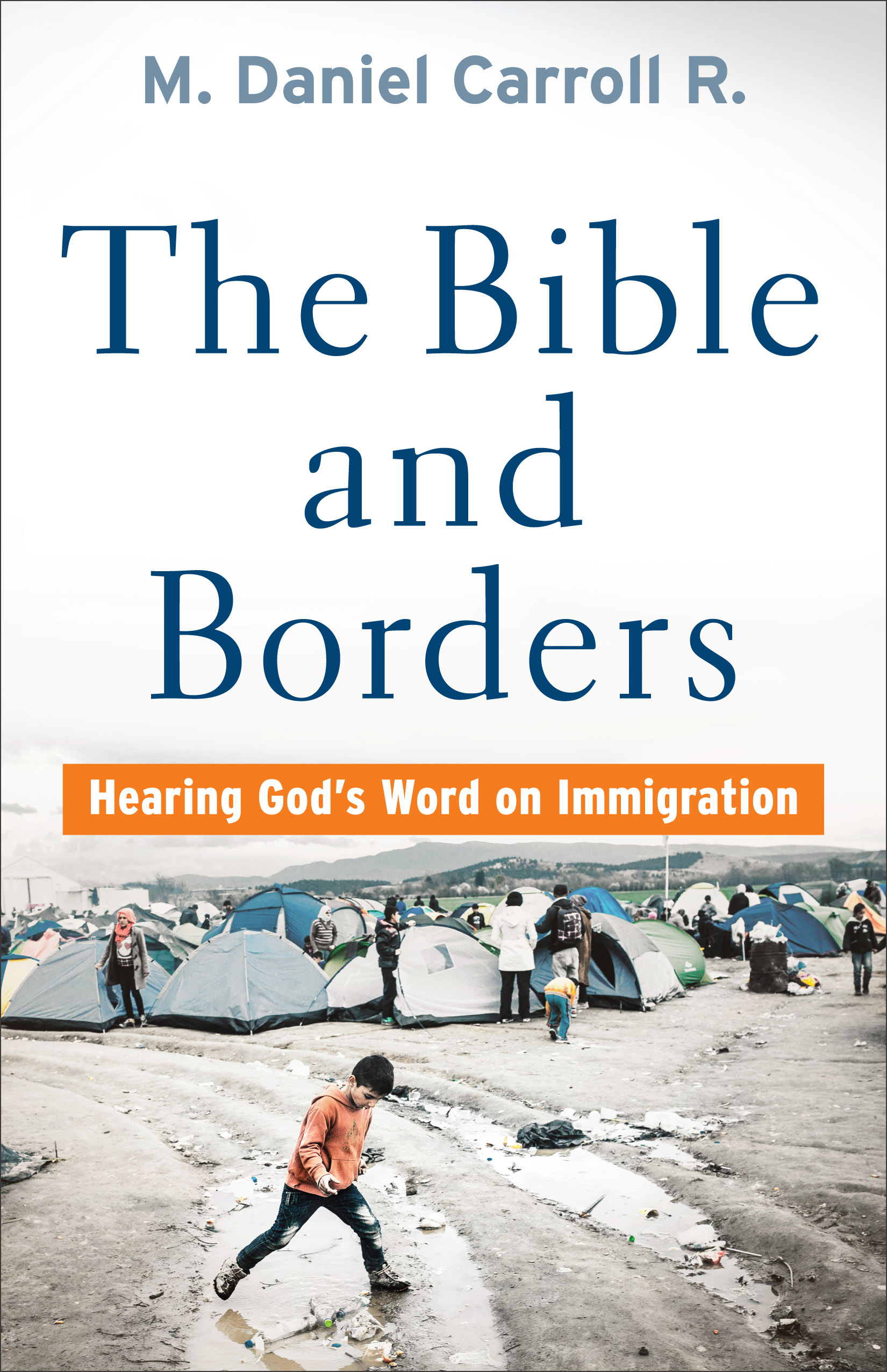The Call to Hospitality
 The following is an excerpt from the new book The Bible and Borders by M. Daniel Carroll R.
The following is an excerpt from the new book The Bible and Borders by M. Daniel Carroll R.
New Testament Teaching
“In the New Testament, hospitality . . . is a prominent theme. Members of the early church often shared meals and provided shelter to Christians and non-Christians, to friends, family, and strangers.
Jesus himself models an attitude of generous hospitality at meals, and this to such an extent that many were scandalized. The Gospel of Luke depicts Jesus as eating in the homes of tax collectors (5:27–32; 19:1–10) and with women (10:38–42). He welcomes the repentant gesture of a sinful woman at a meal in the home of Simon the Pharisee (7:34–50) and heals a sick man in the house of another religious leader (14:1–6). When Jesus sees how guests at this dinner vie for places of prominence, he tells his host that the special invitees at a banquet in God’s sight would be the poor and the sick, those of no social standing, people who would not have the means to repay the gesture (14:12–14). It is noteworthy that the parables of the lost sheep, the lost coin, and the prodigal son follow this meal (15:3–32); they are a response to the criticisms of his eating with sinners (15:1–2). Jesus, of course, is the host who miraculously feeds five thousand (9:10–17). His last meal with his disciples is a powerful gesture of intimate hospitality (22:7–38). At that dinner, Jesus mentions a future eschatological meal that will be prepared for them (22:29–30). A closing revelatory act in this Gospel is the meal Jesus shares with the disciples he met on the road to Emmaus (24:28–31). The theme of openhanded hospitality continues in Luke’s second volume, the book of Acts, where it is a hallmark of the nascent Christian community (2:42–47; 4:32–35). The Gospel of Luke also shows the flip side: those who reject Jesus are characterized by a lack of hospitality (7:39; 9:51–56; 11:38, 42–54; 14:1–6).
In sum, Jesus is the paradigm of hospitality. Other Gospels extend this picture of divine hospitality. For example, at the Last Supper in the Gospel of John, Jesus goes beyond anything a host in his culture would have done by washing his disciples’ feet and mandates that his disciples follow his example (13:4–20); he offers living water to the Samaritan woman at the well (4:1–45), the bread of life to the hungry (6:22–59), and a heavenly home to his followers (14:1–6).
It is to be expected, then, that Christians imitate their Lord and offer a gracious welcome to others. Accordingly, we see passages like Romans 12:13; 14:1; 15:7, 22–25; 16:1–2; 1 Corinthians 16:5–18; Colossians 4:10; Philemon 16–18; and 3 John 5–8. Importantly, the virtue of hospitality was arequirement for leadership in the Christian community (1 Tim. 3:2; Titus 1:8; cf. 1 Tim. 5:9–10). This compassionate stance was to be extended even to enemies (Rom. 12:20–21)!
The early church gathered in homes to enjoy fellowship, meet one another’s physical needs, and share meals. These small assemblies were an ideal setting for practicing hospitality. The most profound opportunity to embody hospitality certainly was and continues to be the celebration of the Lord’s Supper. This meal commemorates the sacrifice of Jesus onthe cross and is based on his final meal with the disciples (Matt. 26:17–29 parr.). If hospitality is about opening oneself up and giving oneself to others, if it should be a time of sharing with all who claim the faith with the full expectation of God’s provision, then the conjunction of the Lord’s Supper and the cross is a powerful demonstration of divine hospitality. All are welcome. We who once were enemies of God have been reconciled to him and have been baptized into one body; all stand as equals before the Lord (Rom. 5:10; 1 Cor.12:12–13; Gal. 3:27–29; Eph. 2). At the Communion table, forgiven sinners embrace other sinners and forgive thosewho have committed transgressions against them (cf. Matt. 6:12; Luke 11:4). It is no wonder that Paul’s instruction onthe Lord’s Supper in 1 Corinthians 11 combines concern for the outcasts and the unfortunate with the call to serious self-evaluation (11:17–34). The Lord’s Supper, so central a symbol of the Christian faith and so important for nurturing the remembrance of the person and work of Jesus, was inseparable from the practice of hospitality.
The early church was quite diverse in gender, social status, and ethnicity. Yet this diversity does not diminish the fact that such blending of all kinds of people from all kinds of places could be quite a challenge! The epistles document how these differences were playing themselves out in local assemblies. A big step in the church’s transition to a multicultural and multinational entity were the experiences of the apostle Peter (Acts 10:1–11:18) and the deliberations at the Jerusalem Council (Acts 15). We see examples of ethnic and cultural tensions in the issues related to caring for Jewish and Greek widows in Jerusalem (Acts 6:1–6) and Peter’s refusal to eat with Gentiles, which drew Paul’s rebuke(Gal. 2:11–14). We notice the powerful statement that in Jesus the wall of separation between Jew and Gentile has come down (Eph. 2:14–22). In contrast to these initial difficulties were settings where difference was part of the social fabric, such as in Antioch, where the church leadership reflected various nationalities and ethnic backgrounds (Acts 13:1–3). One day this richness will be manifest in the heavens, where “a great multitude that no one could number, from everynation, from all tribes and peoples and languages” will gather to worship around the throne of God and the Lamb (Rev. 7:9).
Implications for Today
The New Testament reinforces the importance and value of hospitality, especially in accord with what Jesus said and did. If we claim to be followers of Jesus, how can we refuse to practice that kind of welcome with those who are different and marginalized in society? Today those outsiders include immigrants, refugees, and asylees, however they may have come. The numerous directives in the epistles make this fundamental demand even more explicit for all Christians, especially the leadership.
Of course, the Lord’s Supper should be the consummate demonstration of hospitality to others, especially to the stranger in our midst. At the Lord’s Table, questions of origin, language, or legal status are superseded by the embrace of friends and family and fellow believers. Here is a visible expression and public declaration of the mercy and provision of God; we all come to partake of the bread and cup as sinners before God and in need of grace. To come periodically to the table without a commitment to kindness and openness to others contradicts the purpose and spirit of communing. Remember that Paul connects the practice of the Lord’s Table with ethical demands that do not allow for discrimination. At the very least, the recognition of our sinfulness and of the boundless forgiveness of God should soften Christian attitudes toward outsiders in need—even those who might be undocumented immigrants.
This orientation in attitude does not solve the national legal quandary, but it can impact the direction of the conversation and its tone in ways that resonate with this most important Christian practice. At least it should transform how immigrants and refugees are discussed within the church and how the church concretely can be a beacon of hospitality to the outsider within a society that sometimes can be unwelcoming.

Content taken from The Bible and Borders by M. Daniel Carroll R., ©2020. Used by permission of Baker Publishing www.bakerpublishinggroup.com.
M. Daniel Carroll R. (Rodas) (PhD, University of Sheffield) is Blanchard Professor of Old Testament at Wheaton College Graduate School in Wheaton, Illinois. He is also an adjunct professor at El Seminario Teológico Centroamericano in Guatemala City, Guatemala. Carroll previously taught at Denver Seminary, where he founded IDEAL, a theology program offered in Spanish. He is the author or editor of more than a dozen books, including Wrestling with the Violence of God: Soundings in the Old Testament and a forthcoming commentary on the Book of Amos.





